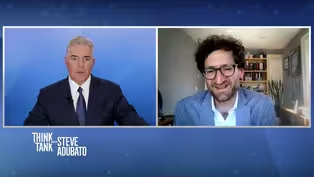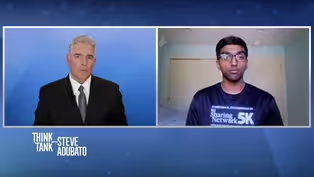
President of NJIT Addresses AI and The Future of Higher Ed
Clip: 6/22/2024 | 9m 47sVideo has Closed Captions
President of NJIT Addresses AI and The Future of Higher Ed
Dr. Teik Lim, President of NJIT, joins Steve Adubato to discuss the future of higher education, artificial intelligence, and diversity on campus.
Problems playing video? | Closed Captioning Feedback
Problems playing video? | Closed Captioning Feedback
Think Tank with Steve Adubato is a local public television program presented by NJ PBS

President of NJIT Addresses AI and The Future of Higher Ed
Clip: 6/22/2024 | 9m 47sVideo has Closed Captions
Dr. Teik Lim, President of NJIT, joins Steve Adubato to discuss the future of higher education, artificial intelligence, and diversity on campus.
Problems playing video? | Closed Captioning Feedback
How to Watch Think Tank with Steve Adubato
Think Tank with Steve Adubato is available to stream on pbs.org and the free PBS App, available on iPhone, Apple TV, Android TV, Android smartphones, Amazon Fire TV, Amazon Fire Tablet, Roku, Samsung Smart TV, and Vizio.
Providing Support for PBS.org
Learn Moreabout PBS online sponsorship- We're now joined by Dr. Teik Lim, who is President of NJIT, that's New Jersey Institute of Technology, fully disclosed, one of our higher ed partners.
Good to see you, Dr. Lim.
- Good to see you, Steve.
Thanks for having me here.
- You got it.
We've been wanting to talk to you about several things.
One of 'em is artificial intelligence and higher education.
How the heck are you and your colleagues in NJIT managing, dealing with the AI universe?
- Well, we are embracing it for sure.
In case you don't know, we are New Jersey only public polytechnic institution.
So we specialize in STEM education.
We have actually been doing AI before AI was a buzzword.
In fact, if you look at the landscape of AI at NJIT, the last four years, we have educated over 1600 students that are well-versed in AI or related area.
Last year we have $60 million in AI research.
We have close to 30 faculty members who are working on AI, various aspects of AI, like machine learning, human-computer interaction, and many other topics of AI.
So we're doing well in AI.
- Dr. Lim, a devil's advocate question.
For those who say, you know what?
I mean, AI is gonna allow students to potentially be less than honest in their classwork.
How do you regulate, manage, and deal with the perception, potentially the reality that AI allows for more, quote unquote, opportunities for cheating?
- I don't believe that is the case.
Cheating has always gone on since human kind came into this world.
You can cheat with any technology.
Someone asked me, what do I think about, say, ChatGPT?
And I took out a pen.
And I say, the pen is a tool.
You use it to write and sign checks and do all sorts of neat thing with it.
But you can also use it to poke somebody's eyes.
So don't do that.
So ChatGPT and AI is the same thing.
We need to embrace what's coming, but we need to use it mindfully.
And we need to be methodical about educating our students to use AI for the good, not for cheating.
Those who cheat will find ways to cheat no matter what.
- They don't need AI to do that.
- They don't need AI to do that, right.
- Dr. Lim, let me follow up on this.
The student body at the New Jersey Institute of Technology, describe it, A, and B, the diversity on the campus is critically important to the culture of the university.
Please.
- Yes, definitely.
So, as you know, a year ago we became an NAPIC, an Asian American, Native American, Pacific Islander-serving institution.
Several months ago, we were also designated as a Hispanic-serving institution, and this is by the Federal Department of Education.
So we're both NAPIC and HSI.
We're a very diverse campus.
In fact, if you think about New Jersey as an R1 institution, a research institution, there's 140 some R1 institution in the country, three in New Jersey: Princeton, Rutgers, and NJIT.
And then you throw on top of that, we, being a polytechnic institution, as you know, STEM has been one of the main factor in technological and economical progress of this country.
If you take all those four factors in one place, there's only one institution that have all four in one place.
That is NJIT.
So if you think about that, the country is getting more diverse.
In order for the country to move ahead economically and technologically, there's two ways.
One, you continue immigration, and we know that has actually fueled economic and technological advancement.
The other one is to make sure everyone gets involved.
And we're doing our part in getting everyone involved.
Because of the diversity on this campus, we're educating Black, Latino, Asian, white, engineers and scientists.
They're the future, in my mind, of this country.
- Along those lines, the diversity of the campus speaks for itself.
People can look at the NJIT website and find out more about the breakdown of the student population.
I'm gonna talk about student opportunity in just a moment.
But the role of a college president as we tape this program at the end of April, is evolving all the time.
You and I were just talking about, before we got on the air, change is the only constant.
Where do you see the role of a college president and the role of a college/university in promoting and protecting free speech, while at the same time protecting its students?
- Yes.
- And faculty, please.
- Of course.
And in the entire campus community, we wanna make sure that anyone that come to this campus can achieve what they set out to come here for, what their goals are, whether they're faculty, students, staff, visitors.
And the principal focus of my job here is to ensure that this is as belonging and as welcoming place as possible so that people can learn and teach and do research and can do all sorts of neat things to improve their lives, to improve lives of other people.
At the end of the day, that's what it's all about, is we are here to improve the lives of mankind.
And the way to do it is through education.
And so we're principally focused on that.
In fact, we just launched our Strategic Plan 2030 to become the nexus of innovation, and the number one priority of our Strategic Plan 2030 is student success.
We're obsessed with student success.
And how that happen is, an innovation nexus is where a physical and intellectual focal point for ideas, for creativity, for actions, for people, focus on innovation and entrepreneurship that include researchers, learners, entrepreneurs, partners from government, industry, higher ed, and the community to serve the students of the future.
- To what degree do you see NJIT, New Jersey Institute of Technology, as an institution of higher learning that creates opportunities for students who historically have not had access to those opportunities?
- Oh, we do that really, really well.
I've always felt that talent is everywhere, no matter where you come from, what demographic and ethnicity.
But opportunity is not.
So we're here to align talent with opportunity.
And the way we do that is number one, we make sure that our education is affordable.
We make sure that our education is attractive.
We know it's attractive, because guess what?
Steve, you may or may not know this.
A third of the engineers and scientists currently working in New Jersey graduated from NJIT.
- One-third.
- One-third, right.
And you know that New Jersey has the highest concentration in the United States of engineers and scientists.
- I didn't know that.
- It's the highest concentration, right.
So we're doing our part in ensuring that people that come from the underserved community, family with limited means, have access to an education.
Almost 50% of our student body are first generation.
92% have some sort of financial aid.
And, guess what?
I did the calculation a couple months ago.
My staff does that from the Office of Finance.
And our in-state tuition fee is about 18,000, give and take, per year, which is still.
- In-state, right.
- Which is still very attractive, very affordable.
But the average out-of-pocket cost of an undergraduate student here is $6,000, average out-of-pocket cost.
- 6,000.
- 6,000 average.
- Interesting, affordability.
- That's very affordable.
- Yeah.
Dr. Lim, sorry for cutting you off, but Dr. Teik Lim is the President of New Jersey Institute of Technology.
Again, one of our higher ed underwriters.
Dr. Lim, I wanna thank you so much for joining us.
We appreciate it.
We'll continue the conversation in another segment.
Thank you, Doctor.
- Thank you, Steve, for having me here.
- You got it.
Stay with us, we'll be right back.
- [Narrator] Think Tank with Steve Adubato is a production of the Caucus Educational Corporation.
Celebrating 30 years in public broadcasting.
Funding has been provided by PNC Foundation.
RWJBarnabas Health.
Let’s be healthy together.
PSEG Foundation.
Newark Board of Education.
The Fidelco Group.
Horizon Blue Cross Blue Shield of New Jersey.
The North Ward Center.
Veolia, And by The Russell Berrie Foundation.
Promotional support provided by Insider NJ.
And by Northjersey.com and Local IQ.
(Sounds of Water) - (Narrator) Most people don’t think of where there water comes from.
But we do.
Veolia, more than water.
Resourcing the world.
Addressing Homelessness and Small Business in Newark, NJ
Video has Closed Captions
Clip: 6/22/2024 | 9m 10s | Addressing Homelessness and Small Business in Newark, NJ (9m 10s)
How This Youth Volunteer Is Making Progress In His Community
Video has Closed Captions
Clip: 6/22/2024 | 7m 59s | How This Youth Volunteer Is Making Progress In His Community (7m 59s)
Providing Support for PBS.org
Learn Moreabout PBS online sponsorship
- News and Public Affairs

Top journalists deliver compelling original analysis of the hour's headlines.

- News and Public Affairs

FRONTLINE is investigative journalism that questions, explains and changes our world.












Support for PBS provided by:
Think Tank with Steve Adubato is a local public television program presented by NJ PBS

